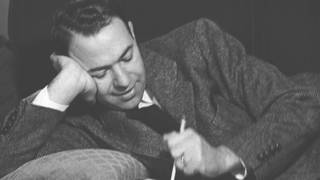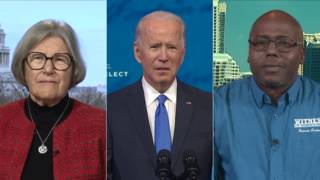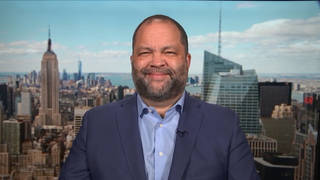
Related
Guests
- Lawrence HayesCo-Founder of the Campaign To End The Death Penalty. He is a death row exoneree.
- Darby Tillisone of the first to be exonerated from death row in 1987.
As last-minute efforts are made to stay the execution of Georgia death row prisoner Troy Anthony Davis, we speak with two former death row prisoners who have since been released. Darby Tillis was freed in 1987 after new evidence emerged about his decade-old case. Fourteen years later, Tillis was pardoned based on actual innocence, making him one of the first death row prisoners to be exonerated. We are also joined by Lawrence Hayes, who was a death row inmate in New York before the U.S. Supreme Court suspended capital punishment in 1972. Hayes was paroled in 1991 after 20 years in prison and since then has become a spokesman against the death penalty. [includes rush transcript]
Transcript
AMY GOODMAN: “Killing Flo’, Death Row” by Darby Tillis, our next guest. This is Democracy Now!, democracynow.org, The War and Peace Report. I’m Amy Goodman, with Democracy Now!'s Renée Feltz. We're in Atlanta, Georgia, and we’ll be broadcasting, as well, tonight from 6:00 to 8:00 on our website at democracynow.org and on public radio and television stations around the country, from the prison grounds in the Jackson, Georgia, prison where Troy Anthony Davis is scheduled to be executed by the state of Georgia at 7:00 p.m. tonight. Renée?
RENÉE FELTZ: Well, we turn now to two men who were former death row prisoners and have since been released. Darby Tillis was sentenced to death in Illinois on October 15th, 1979, for the murder of an employee of a hot dog stand on the North Side of Chicago. He always maintained his innocence and was freed on January 21st, 1987, after new evidence about his case was revealed. Fourteen years later, the governor of Illinois granted Tillis a pardon based on actual innocence. He was one of the first death row prisoners to be exonerated.
AMY GOODMAN: We are also joined by Lawrence Hayes. He was a death row prisoner in New York before the U.S. Supreme Court suspended capital punishment in 1972. In 1968, Lawrence Hayes became a member of the Black Panther Party. In '71, he was arrested for, quote, “acting in concert” at a murder scene of a policeman and was sentenced to death. He was one of five New York State death row prisoners who were awaiting execution at the time of the Supreme Court's 1972 Furman v. Georgia decision that established a moratorium on the death penalty. His sentence was commuted to life with parole. Lawrence Hayes was paroled in ’91 after 20 years in prison, has since become outspoken against the death penalty.
We welcome you both to Democracy Now! Darby Tillis, let’s begin with you. You might not be here today, as Troy Anthony Davis might not be here tomorrow. Tell us what happened in your case and why you’re in Atlanta today.
DARBY TILLIS: Well, there was prosecution misconduct, jailhouse snitches and racial problems. It was a manufactured case. I was tried five times, including three hung juries. And I think—
AMY GOODMAN: You were tried five times?
DARBY TILLIS: Yes.
AMY GOODMAN: Three hung juries?
DARBY TILLIS: Yes.
AMY GOODMAN: Isn’t there something called “double jeopardy”?
DARBY TILLIS: It didn’t work in my case. They printed an article saying, “We’re going to try him until we killed him.” And that’s what they intended to do. But there was a big mishap. During the time this all happened, the young lady who lied, who said she drove us there, waited on us, and drove us away, they never charged her with conspiracy, accessory, accountability or anything. Instead, they paid her cash money. They also paid her cash money to relocate her to a better neighborhood. This woman said to her supervisor on her job, “Me and my boyfriend went on the North Side and killed two people, and I’m going to court to get the best deal.” Young man, he shrugged it off: she’s always lying.
Well, upon my case being reversed and remanded back to the lower court, Rob Warden, who is now the head of the Innocence Project at Northwestern, had a paper called The Lawyer. And he wrote this article called “Death Train Derail.” It was read by most lawyers and assistant states attorneys and whatnot. And this young man who was her supervisor had now become assistant states attorney in an adjacent county, in Lake County, I think. I think it was Lake County. And he read the article. And he sent me his telephone number. And I kept it for several years. I called the Coalition Against the Death Penalty and said, “Please send me a good attorney.” And they said, “We got a good attorney for you. His name is Bill Murphy.” And Bill came in. I tendered Bill the number.
And Bill hurriedly came back and says, “I got good news and bad news.” “What’s the good news, Bill?” And he says, “Well, she told her boss her and her boyfriend did the killing.” After being tried with an all-white jury, I wasn’t too big on white people at the time. I says, “What? Are they white?” He said, “Yes, he’s white.” He said, “Not only that, Darby. He’s assistant states attorney.” I said, “Well, he’s in the business of putting people in jail. He’s not going to risk his career for me.” He said, “He’s a straight shooter.” I said, “Well, I’ll tell you what you do: you go back to practicing law, and I’ll go back to praying.”
And after—for the fourth trial, he came in and testified. And we hung another jury, after the fourth one. And the fifth trial, we had a bench trial. And the judge says, “This man has nothing to gain. He puts his career on the line. He has worked for the FBI strike forces. He has security clearance with the military. And he’s assistant states attorney, just as I was. And I believe him. And as bad as I hate to do it, I have to set you free.” But I was released from death row. I was not free of death row. I never will be free of death row.
AMY GOODMAN: What do you mean?
DARBY TILLIS: Death row lives in me. And this is why I’m here today. I will always continue, as long as there is a man anywhere on death row, to fight for the abolishment.
RENÉE FELTZ: Lawrence Hayes, we talked a little bit about what your journey has been through while you were on death row. Can you talk about what happened to you and how that relates to why you’re here today, as Troy Davis is scheduled to be executed tonight?
LAWRENCE HAYES: Well, as a member of the Black Panther Party, I was involved with a cell that was geared toward ridding drugs, keeping drugs out of the African-American community. I mean, it was a dream. We were young, and we thought we could do it. And so, we raided drug drop spots. And on one of these occasions, I had to call in an ambush, you know, simply because two of my comrades went into a—you’d be surprised where drugs pass hands. We went into a delicatessen, and we were doing surveillance. And I heard gunshots, which was not supposed to happen. I ran to the door, and one of my comrades bumped up against me, and I could tell, through his grunt, that something was wrong with him. And I heard him fall behind me. But my attention was on a American—a European American who stood before me, and he had a gun pointed at me. Then he pitched forward. He fell to the ground. I turned, and my comrade had fell in front of a tree. And I had bent down to examine him, and the tree exploded. People were shooting at me. I got around the tree. My training came in. I found—I looked at my comrade. I thought he would survive based upon my observations—he was shot in the shoulder. And I left. I went from one shadow to another shadow, trained to do that.
A week or two later, I was arrested at the Canadian border, and I was taken to a state trooper barracks. I was beaten. I can’t even describe the beating I received. I was unconscious. I mean, beat me ’til I was numb. And later on, I—alleged to have given a confession. I was charged, tried and convicted by an all-white jury, all male, average age 55, out of Queens County. It has historical value. However, a year after I was—well, a year after I was in the death house, the district attorney in my case was disbarred for taking bribes from organized criminals. A year and a half after I was in the death house, the judge in my case was cited in a New Yorker magazine article by Jack Newman as being one of the 10 worst judges in New York State because of his favoritism to organized criminals. Later, it was determined that the lawyer who was assigned to me to represent me was a lawyer who frequented organized crime clients.
RENÉE FELTZ: The lawyer assigned to represent you.
LAWRENCE HAYES: Yes, yes. It was also—I also got a hold of the autopsy report for my comrade, and he had bruises and contusions from head to toe. Almost every bone in his body was fractured or broken. And he had a hole in his head the size of a grapefruit, which when they came and they discovered it was a police officer, they beat him. And I imagine one of them kicked him in the head with those steel-toe boots and opened up, you know, his head. However, Furman v. Georgia occurred, and I was released from the death house. I see that whole thing as—I was involved in a historical circumstance that cost two human lives. And for that, you see, I morally and spiritually am ashamed. And I feel, you know, remorse about that. That’s part of why I’m involved in abolishing the death penalty. It’s—
RENÉE FELTZ: Let me jump in here, briefly. We don’t have that much time. You’ve come all this way to Georgia to be here in a very tense evening, very tense situation. Two things. What do you have—New York let you off of death row. You were released, essentially. Is that right?
LAWRENCE HAYES: Yeah, United States Supreme Court.
RENÉE FELTZ: Yes, yes. Now you were released. Now, what do have to say to the Supreme Court, to Georgia, on this day of reckoning? And finally, what do you have to say to Troy?
LAWRENCE HAYES: Well, I mean, this is all wrong. This is all wrong. I know a little law. This is all wrong. I think that the Antiterrorist Effective Death Penalty Act is against all Americans. It stymies due process. It interferes with due process. Troy has issues he still could bring, except for that law. You know, I say to Georgia, and I say to all legislators: how do you, in one stroke of a pen, say killing is wrong, and in the next stroke of the pen, authorize the state to kill? I think that’s wrong. You know, I believe that—I say to Troy: listen, I’ve been where you are, you know, and the fact that you still have your sanity and you have come to terms with your issues says to me that the same—we share the same spirit here. I was innocent of that crime. I didn’t kill anyone. And so, I felt innocent. And I see and I feel that, the same thing in Troy Davis. Like—
AMY GOODMAN: We have to leave it there, and I want to thank you very much for being with us, Lawrence Hayes and Darby Tillis. Both served time on death row. Both are now free. We’re broadcasting from Georgia. Troy Anthony Davis is scheduled to die 7:00 p.m. Georgia time. We’ll be at the Jackson prison where the execution is scheduled. We will cover events through the day. You can follow us at democracynow.org from 6:00 to 8:00 Georgia time, Eastern [Daylight] Time. We’ll be broadcasting at democracynow.org. And Pacifica and NPR and PBS and public access TV stations, Free Speech TV and Link TV will all be broadcasting Democracy Now!’s two-hour special from the prison grounds in Jackson, Georgia. Tune in.












Media Options